Intense Grief Feels Like You’re Dying
When Chris was diagnosed with cancer, I wished it was me.
I couldn’t do it. There was no way that I was going to survive; I felt like I was dying too. “Make it stop,” I asked everyone, but no one did.
My mind refused to accept that what was happening was real. I was 8 months pregnant, had a son who had just turned 3, and a 1.5-year-old daughter.
When I woke up each morning, I thought that it had all just been a bad dream, but it never was.
The reality felt so horrible that based on that alone, I believed the diagnosis could not be true.
Somehow, awfulness was proportionate to reality – I really thought that.
The pathway to get from where I was to where I am now did not exist. You can’t conceive it either; you have to live every stinkin’ moment.
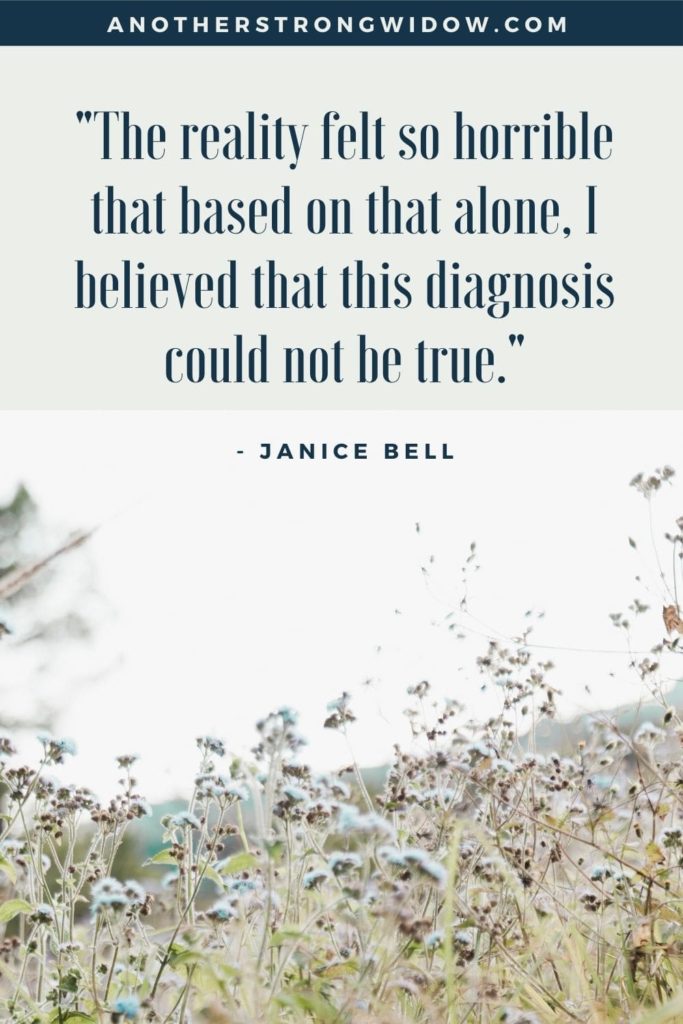
You have to stumble, you have to fall down, and you have to drag your ass through it all.
You need to find people, you need to lose people, and you even need to toss some.
You go low, and then you go lower.
Alone, you live by the breath some days.
Then…you begin to rise, but don’t be mistaken, and think you just keep going up either. That would be foolish; there are still stumbles and crashing waves ahead.
In Fight or Flight
A little bit of stress here and there can be a good thing. It gets your body moving, and it keeps your mind alert, but too much stress, too frequently, can lead to major health problems.
When your body’s stress response system is constantly activated, it leads to an abundance of adrenaline and cortisol surging within you.
The long-term activation of these hormones can disrupt almost all of your body’s processes, and chronic stress puts your health at an increased risk.
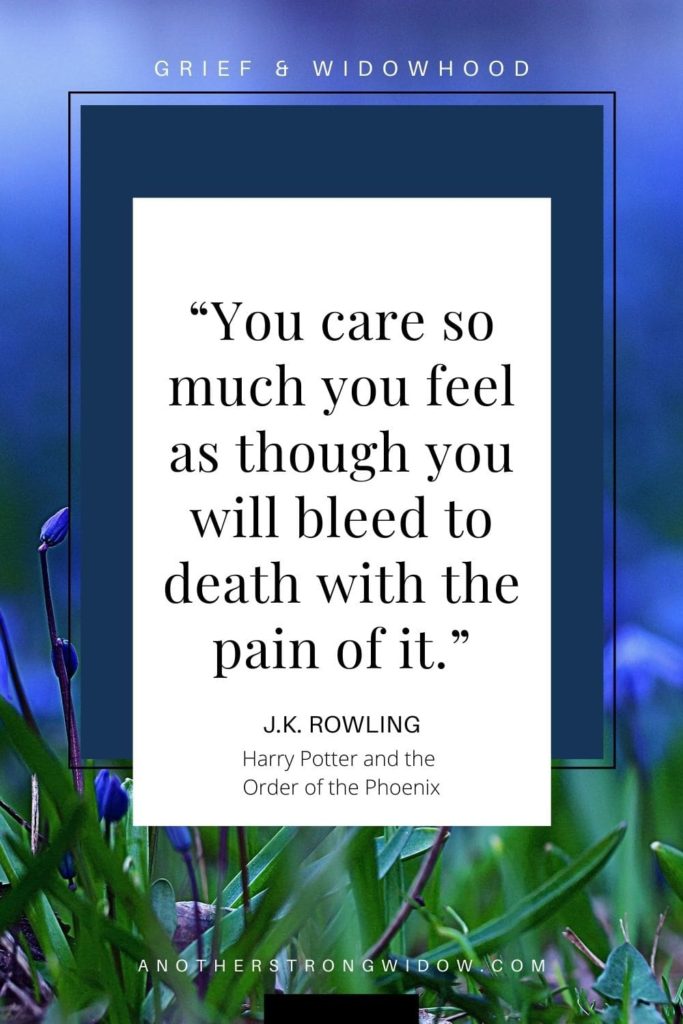
The Holmes and Rahe Stress Scale
In 1967 psychiatrists Thomas Holmes and Richard Rahe discovered a positive relationship between stressful life events and illness.
They created a list of 43 life stressors based on medical records and rated them relatively against each other.
The most stressful life event at the top of the list is the death of a spouse with 100 points.
The list ends with a minor violation of the law, ranking at 11 points.
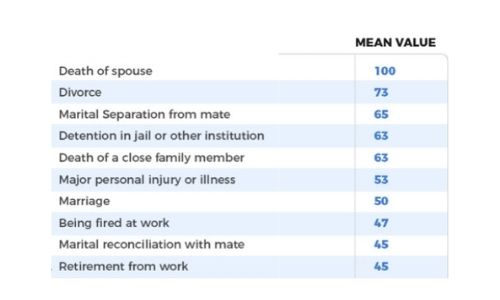
To use this test, an individual will add up all the point values associated with the life stressors they have experienced over the past 12 months.
A score of 300 or higher indicates an 80% risk of developing a stress-related illness, 150-299 points is a 50% risk of experiencing stress, and less than 150 correlates to a 30% risk of suffering from stress.
Click here to check out the full list of life stressors and their rankings.
The Snowball of Loss
The stress of grief is unbearable, but in addition to the loss of your life partner, being a young widow (maybe with children) is overwhelming when the secondary losses to death are combined.
Hopes, dreams, and plans evaporate, jobs are lost, and homes become no longer affordable. Painfully, friendships are lost, and support scatters after a few months, but the list goes on and on. It’s not surprising our bodies ache, and our brains can barely function.
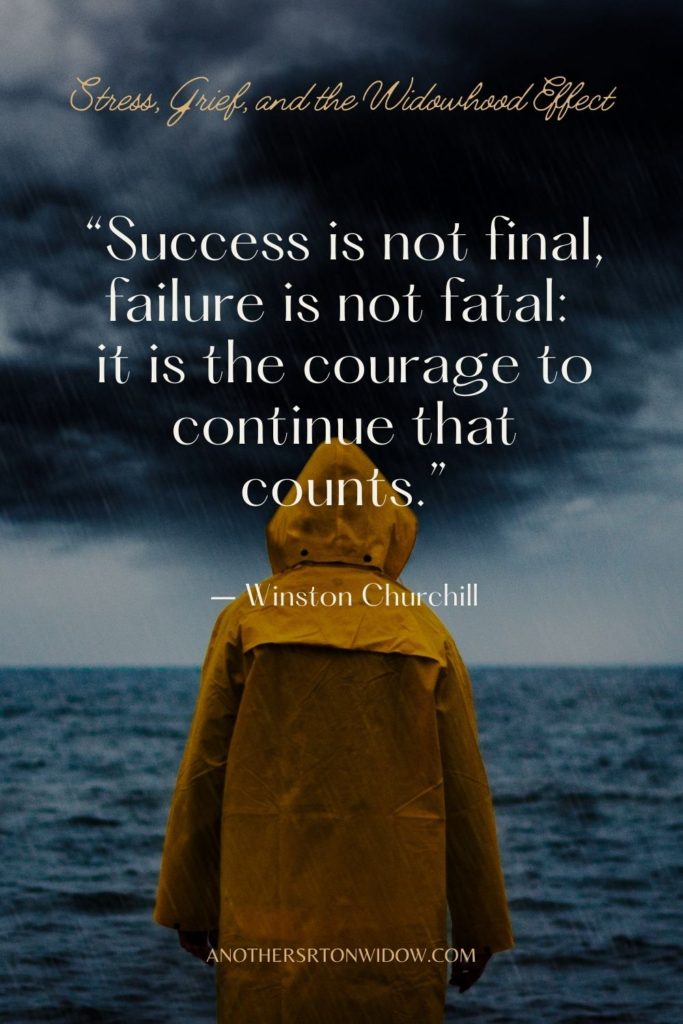
Death By Suicide
Long-term stress leads to depression and anxiety.
The widowed population is two and a half times more likely to die by suicide in the first year of widowhood than the general population.
The rate of death is also shown to be greatly elevated when the age of widowhood is decreased.
One study in the United States found a seventeen times increase in the probability of death by suicide for young widowed white men, and it is estimated that at least 1 in 100 young widowers will attempt suicide.
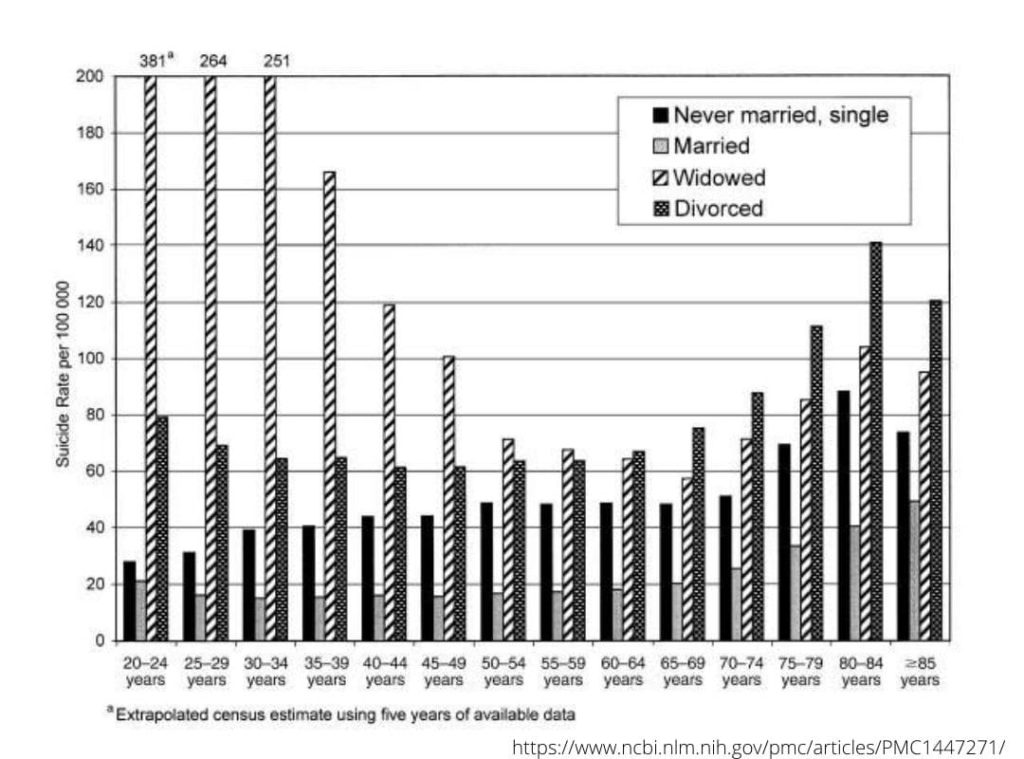
Suicide rates for adult White males, by marital status and age: United States, 1991–1996. .
Widowed women are also at an increased risk; however, their rates of mortality are not as high. One reason for this may be because women choose less lethal methods and are not as successful at completing suicide.
Widow Support
The online young widow groups are filled with talk of suicidal thoughts. In these judgement-free places, with others who can relate, suicidal tendencies have almost become normalized and accepted as a symptom of grief.
Widows and widowers are really struggling, and any behaviour that will help you get through those early grief days and survive to see another sunrise is supported.
Those who look on from the outside make judgements about drinking, promiscuity, risky behaviours, etc. (which also lead to increases in death), but the way we see it is that those who do not understand are fortunate.
Are Young Widows Falling Through the Cracks?
Did any of the medical professionals you came in contact with after your partner’s death monitor your mental health or suicide risk?
Shouldn’t someone at least question all the cancer medications I have in my house?
What about the isolation once we hit the pandemic?
Why does this so easily identifiable, extremely high-risk group of people feel so ignored?
The Widowhood Effect
Death from suicide is not the only cause of mortality increase seen in widows.
A large study in the United States concluded that cancer, infections, cardiovascular diseases, and accidents resulting in death are all more common in widows/widowers.
Collectively, scientific literature has named this increased risk of dying after losing your partner the widowhood effect.
The University of Michigan Health and Retirement Study is a collection of Americans’ data over fifty years of age. With this ongoing study, researchers have determined that within the first three months after the death of your spouse, you have a 66% increased risk of dying. Other earlier studies have concluded an even higher risk of dying during the early months of bereavement at a whopping 90% increase compared to married individuals, and findings vary across research about whether or not men are at higher risk.
The majority of the data focuses on older generations because there simply is more information to work with. Still, some research has suggested that the impact of the widowhood effect is even more pronounced among young people.
Amidst varying results, trends remain the same – becoming widowed sucks, and it’s a risk to your health.
Chronic Illness and Widowhood
Over time, stress hormones will weaken your immune system and reduce your body’s response to foreign invaders.
Prolonged stress can also alter certain hormones in your body, increasing the risk of developing cancer.
The rate at which cancer progresses has also been linked to chronic stress, depression and social isolation.
My Diagnosis
My body gave up; it said no more stress.
I am a statistic of the widowhood effect. I have been diagnosed with inoperable, advanced cervical cancer.
My cancer is still treatable, and I will be attacking this latest challenge aggressively.
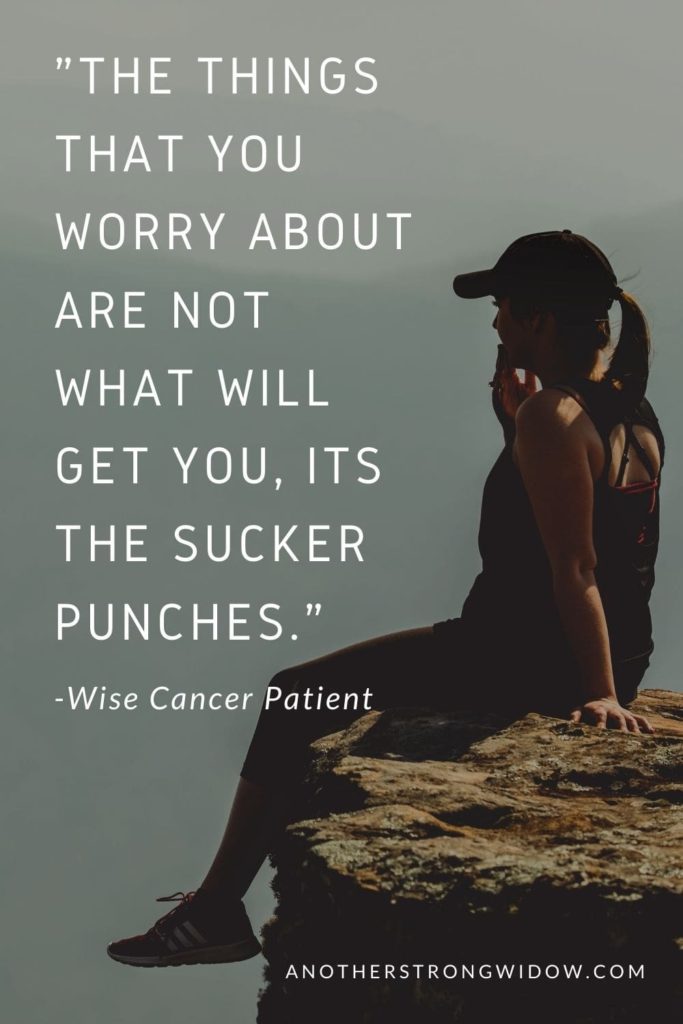
I’ve had three babies in the last five years, multiple pelvic exams (as recent as February), and have never missed a pap smear. I am frustrated and believe that my disease should not be this severe. I was not irresponsible with my health, but still, no one detected signs of cancer.
When I started bringing symptoms to the attention of doctors, I was dismissed as having health anxiety. I was told what I was experiencing was normal, especially for someone undergoing a lot of stress.
No one would listen.
My husband recently died of cancer, and therefore it was easy to tell me that I was too young and assume that I had fears and anxiety associated with trauma.
Listen to your Body
I know grief is exhausting and feels like it is impossible to do anything, but please, I am here to tell you that you must never stop advocating for your health. You are not crazy.
When my husband was sick, I couldn’t find others like me, but once he died, a whole community unfolded in front of me.
These women who have walked alongside me out of this widowhood fire are some of my best friends now, and they are going to walk into this next blaze with me too.
Click here to read my post, 12 Extraordinary Reasons Why I Love Widows.


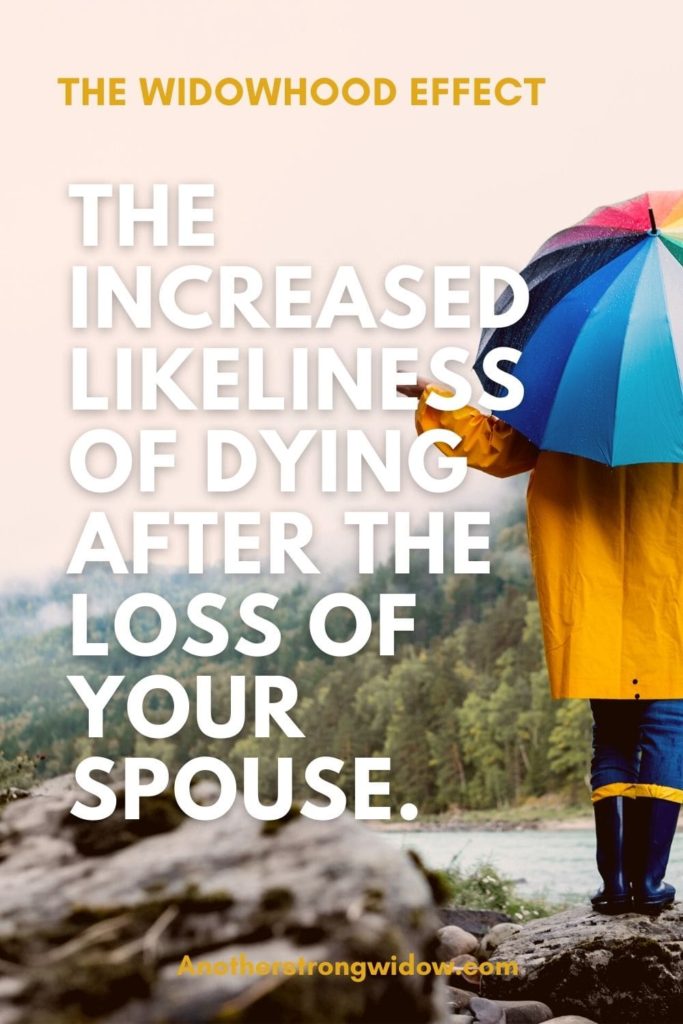
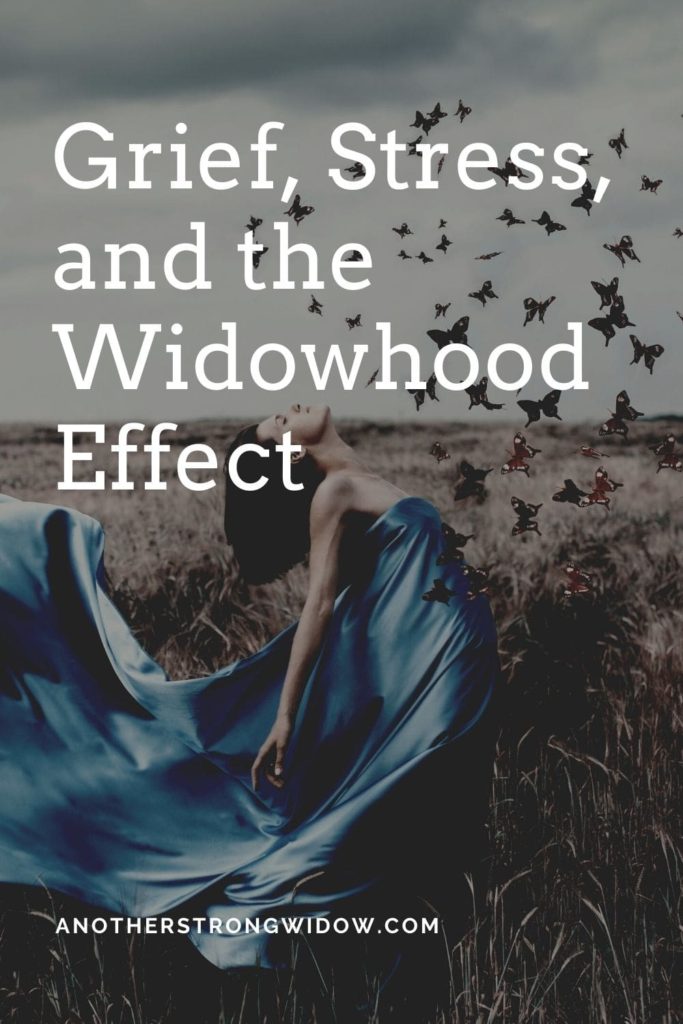


I am so sorry about this diagnosis. You are in my prayers.
Janice, I’m so overwhelmed with emotion for everything you are going through. I can only imagine how you are feeling. I know one thing, you are an absolute kick ass warrior, and I have no doubt you will face this challenge with the same fortitude that you have shown in all the challenges thus far. I know I am in NL, but I mean it when I say, I’m here for you in any way I can be. I’m sending you the tightest virtual hug. And I hope you can feel my love from across the ocean.
What can I do for you? But, I myself have been asked that same question numerous times and never know how to answer. I also do not want to be intrusive. However, ….. I am here to drive you to appointments. Pick you up. Wait with you. Wait outside while you are inside. Help with your littles. I will do your laundry so you can rest or you can have time with the children. Share a glass of wine or make sure your favourite libation is on hand. I am at a loss for ideas but will figure some things out. This diagnosis is not fair, but you and I already know the reality of ‘not fair’. There are many of us in your corner and here to help. <3
I’ve lost my husband in December to covid and I have been really struggling coping with the kids and just all the stuff that goes with loosing your “life”. I discovered you in Instagram and have been following you since then. You are such an inspiration to me to hang on to life. Thank you for helping me even though you have all this stuff going on in your own life. I’m sending you hugs and strength for what you going through now.
I just found you and I’m so happy I did. I am not a young widow but I can relate to all I have read. I’m sorry about your diagnosis and have asked people to pray and get it out to their prayer chains
Thank You Harrietta.
Hi Janice
Everything you said touched me so very deeply. I lost my husband to Covid last year after 40 years of sharing my life with him. Most days just breathing was difficult and if it wasn’t for my family, I don’t think I would be here writing this comment. I think your courage is admirable and I am so proud of your fighting spirit. May you never lose hope and faith and sheer willpower. I think that the worst thing that could have happened to us , has happened….and That has given us widows the determination and grit to put one foot infront of the other and show our metal. None of us will ever be the same again, but our hard won survival will push us forward. You have got this! I am thinking of you.